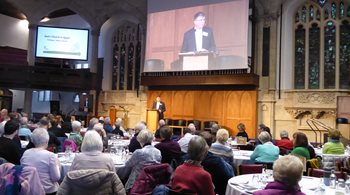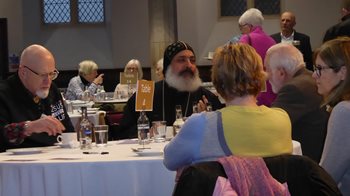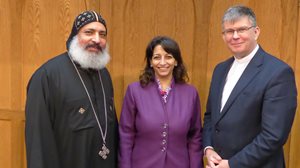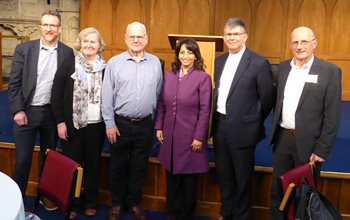The conference was the fifth in series of events over the last nine years, where PCI has heard from Christians living out their faith as disciples of Jesus Christ in the Middle East, hearing first-hand what God is doing through the Church there and the challenges that it faces.
 Organised by PCI’s Council for Global Mission, the keynote speaker at ‘God’s Church in Egypt: Challenges, Calling and Creativity’, was Dr Anne Zaki, Professor of Preaching and Practical Theology at the Evangelical Theological Seminary in Cairo, which celebrates its 160th anniversary this year.
Organised by PCI’s Council for Global Mission, the keynote speaker at ‘God’s Church in Egypt: Challenges, Calling and Creativity’, was Dr Anne Zaki, Professor of Preaching and Practical Theology at the Evangelical Theological Seminary in Cairo, which celebrates its 160th anniversary this year.
Born in Cairo, the daughter and granddaughter of pastors, this was Professor Zaki’s first visit to the island of Ireland. She explained that Christianity was brought to Egypt by John Mark, also known as Mark the Evangelist, the writer of the second of the New Testament’s four Gospels, “Since the day of Pentecost, by God’s Grace, the Church has had an unbroken presence in Egypt, and it is little known outside of my country that from the first to the seventh century, prior to the Islamic conquests, Egypt was a Christian country,” she said.
In the Middle East, Professor Zaki said that there are between 15 and 20 million Christians, and of that, 10 to 15 million live in Egypt. Of the Christian community itself, the largest group in Egypt is the orthodox church, the Coptic Christians, while the second largest group are the Protestant/evangelical Christians with 18 denominations of 1.5 million people worshiping in 1,600 churches. Presbyterians number 500,000 in 450 churches with the third largest group being the Coptic Catholic Church.
Professor Zaki, who is a member of the Presbyterian Church in Egypt, also known as the Synod of the Nile, told the conference that as a nation, Egypt finds itself in what she called ‘a circle of fire’. “To the south there is war in Sudan, to the east of us we have Gaza and the Palestinian/Israeli conflict there, with Iran and Syria further east still, to the west there is Libya and to the north, the Russia Ukraine war.
 “However, God not only entrusted His Son to us, when Mary and Joseph escaped the clutches of King Herod, God has preserved our nation and Church. He has been gracious to use Egypt, and it is a beautiful testimony that He continues to bless and preserve a faithful few, as we are an unbroken, but dwindling presence in our nation.
“However, God not only entrusted His Son to us, when Mary and Joseph escaped the clutches of King Herod, God has preserved our nation and Church. He has been gracious to use Egypt, and it is a beautiful testimony that He continues to bless and preserve a faithful few, as we are an unbroken, but dwindling presence in our nation.
“Having said that, Egyptian society today recognises that we were once an all-Christian country and appreciates its national Christian heritage and the impact that our faith has had on the shaping of our country. We are very much a part of Egyptian society and it is well known that the best hospitals and schools are Christian run, with 50 to 60 per cent of students in our schools coming from Muslim homes. At the same time, the Coptic Evangelical Organisation for Social Services, is the biggest NGO in the Middle East and is a tremendous witness,” she said.
Professor Zaki also explained that while Christians were respected, it was very difficult for Muslims who convert, and those that do often go ‘underground’. “As many churches suffer around the world, we too are a suffering Church, we just suffer from different things. A developing economy that is flatlining, our geography places us in a region of considerable ongoing unrest, and we are a small minority community in a majority Muslim country. All of these things are challenging for us,” she said.
.JPG.aspx?width=350&height=196) “Another challenge is that as long as you are born into our community, Egypt is a very tolerant country towards Christians. For our brothers and sisters in Christ who were once part of the majority Muslim community, it is difficult. Their identity cards may say ‘Muslim’, just as mine says ‘Christian’, but theirs can’t be changed. This means that many Christians remain ‘official Muslims’ and are ‘unseen’ and are unable to practice their faith as openly as I can. It makes evangelism hard, but we are reaching out in mission, regardless of the challenges, and have done so for nearly 2000 years.”
“Another challenge is that as long as you are born into our community, Egypt is a very tolerant country towards Christians. For our brothers and sisters in Christ who were once part of the majority Muslim community, it is difficult. Their identity cards may say ‘Muslim’, just as mine says ‘Christian’, but theirs can’t be changed. This means that many Christians remain ‘official Muslims’ and are ‘unseen’ and are unable to practice their faith as openly as I can. It makes evangelism hard, but we are reaching out in mission, regardless of the challenges, and have done so for nearly 2000 years.”
Opening the conference in prayer, and a reading from the Book of Acts, Chapter one, PCI’s Moderator, Right Reverend Dr Sam Mawhinney, welcomed Professor Zaki warmly, saying that it was a privilege to be able to share fellowship with the Church in Egypt. “Seven years ago, my predecessor Dr Noble McNeely, attended one of the largest Christian events to have taken place in the Middle East in recent years. It was a celebration of the 500th anniversary of the Reformation and came at a time when Christians in the country were facing a severe terrorist threat.”
Dr Mawhinney continued, “While celebrating the anniversary of that liberating event, the Presbyterian Church in Ireland wanted to stand in solidary with our brothers and sisters in Christ at that time. Today, we continue to stand in prayerful solidarity with them, and welcomed this wonderful opportunity to hear from, and learn from, Professor Zaki of the ongoing work of Jesus in Egypt, and more broadly in the Middle East and North Africa, as a minority ourselves in this land. We have certainly learnt much today that we need to reflect on and pray about.”
 While the conference was primarily on Egypt and the Church there, PCI has focused on the region in previous years. In 2015 the Council for Global mission hosted the conference ‘Faith in the Furnace – Challenges facing the Church in the Middle East’, where the keynote speaker was Rev Farouk Hammo, Senior Pastor of Baghdad Presbyterian Church in Iraq. In 2017 Dr Mike Bassous, General Secretary of the Bible Society Lebanon, spoke at PCI’s conference ‘Hope Unexpected – Lessons from the life of the church in the Middle East’, while in 2018 the academic dean of Nazareth Evangelical College Rev Dr Yohanna Katanacho spoke at ‘Hard pressed, not crushed, a window on the Christian experience in the Middle East.'
While the conference was primarily on Egypt and the Church there, PCI has focused on the region in previous years. In 2015 the Council for Global mission hosted the conference ‘Faith in the Furnace – Challenges facing the Church in the Middle East’, where the keynote speaker was Rev Farouk Hammo, Senior Pastor of Baghdad Presbyterian Church in Iraq. In 2017 Dr Mike Bassous, General Secretary of the Bible Society Lebanon, spoke at PCI’s conference ‘Hope Unexpected – Lessons from the life of the church in the Middle East’, while in 2018 the academic dean of Nazareth Evangelical College Rev Dr Yohanna Katanacho spoke at ‘Hard pressed, not crushed, a window on the Christian experience in the Middle East.'
Over the years senior Presbyterians have also visited the Middle East. Also in 2018 the President of Presbyterian Women was in Lebanon, that same year the Moderator, Dr Charles McMullen, visited Jordan. Last year Dr John Kirkpatrick, spent five days in Lebanon, which was the focus of PCI’s 2022 World Development Appeal.
That interest continues as Rev Dr Donald Watts, PCI’s International Relations Agent, said that today's conference had been a great opportunity to hear from such a renowned speaker. “The Christian Church has a long history in the Middle East, and we have heard from Christians from various parts of the region over the years, yet in PCI we don’t know much about the Church in Egypt, and its undoubted influence. The insight that Professor Zaki brought to us today has been important in our ongoing understanding of the region,” he said.
 Dr Watts also explained that he is leading the International Relations Task Group of PCI’s Global Development Committee, which is looking at how the Church can show solidarity with, provide support for, and learn from Christian communities in the Middle East. The Task Group will bring its report to the General Assembly in June.
Dr Watts also explained that he is leading the International Relations Task Group of PCI’s Global Development Committee, which is looking at how the Church can show solidarity with, provide support for, and learn from Christian communities in the Middle East. The Task Group will bring its report to the General Assembly in June.
“Christian communities in many parts of the world endure isolation, discrimination and persecution. This includes the complex context of the Middle East, made very real in recent months by the current conflict, so it is important for us to hear from those who live there and live out their faith in the region. Today’s conference, and what Professor Zaki had to say, was not only prescient to our work as a Task Group, it was an important opportunity for those within our denomination who have an interest in the Middle East, to hear from a very well respected academic and theologian,” Dr Watts said.
Shortly after the attack by Hamas on Israel in October last year, and the outbreak of renewed conflict in the Palestinian Territories, Dr Mawhinney wrote to all ministers in PCI’s 500-plus congregations asking them to encourage their members ‘to pray earnestly for this unfolding crisis.’
Photos (1) The Moderator, Rt Rev Dr Sam Mawhinney opening the conference (2) over 100 people attended the conference (3) Professor Zaki speaking in the Assembly Hall, (4) Professor Zaki and the Moderator are pictured with one of the conference attendees, Father Angelos of St Stephen's Coptic Orthodox Church in Belfast (5) some of those who organised and particpated in today's conference (left to right) Rev Richard Kerr, convener of the Council for Global Mission's Global Concerns Committee, Rev Susan Moore who conducted the Q&A session, Rev Dr Donald Watts, PCI’s International Relations Agent, Professor Zaki and the Moderator with Rev Uel Marrs, Secretary to the Council for Global Mission.